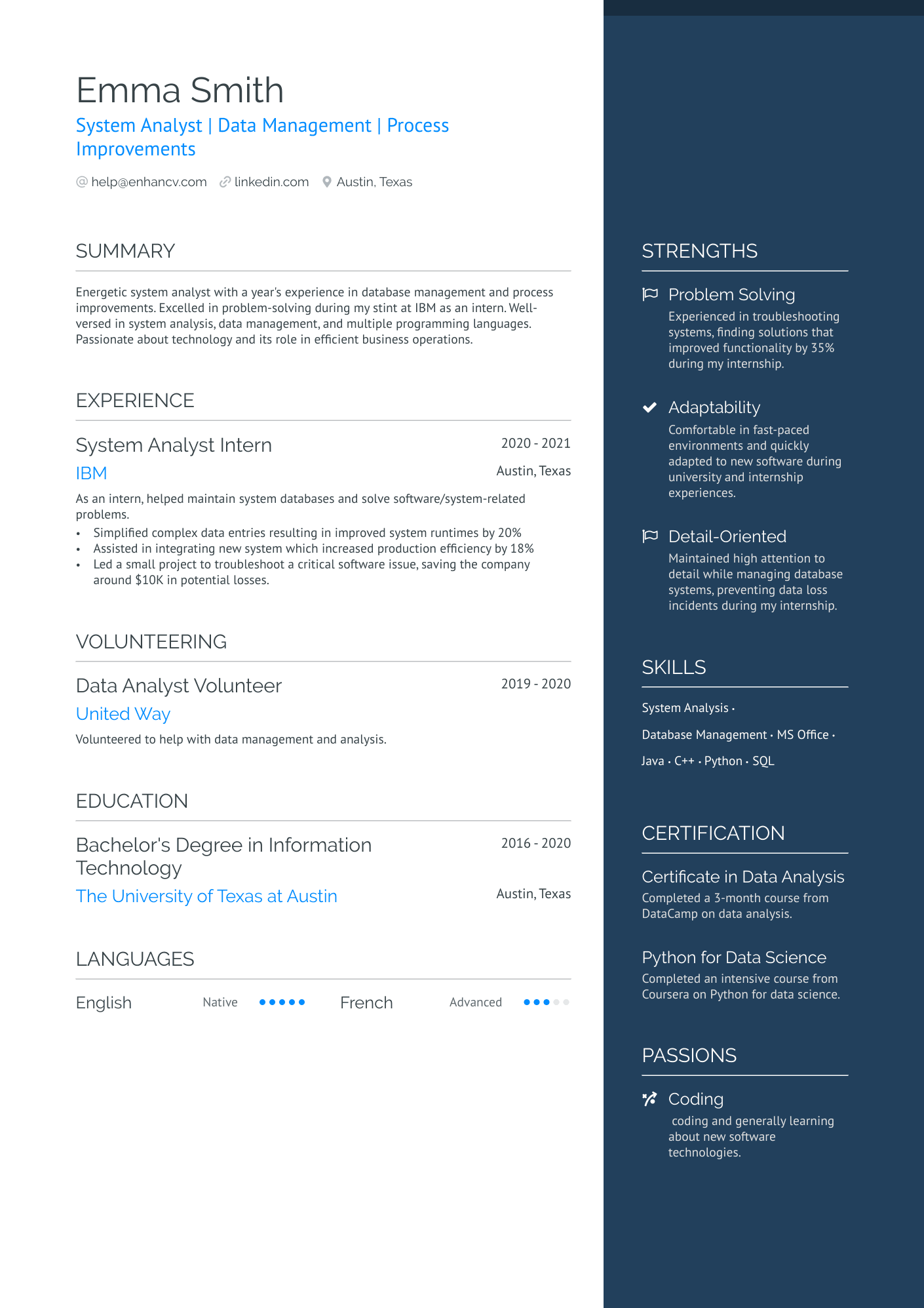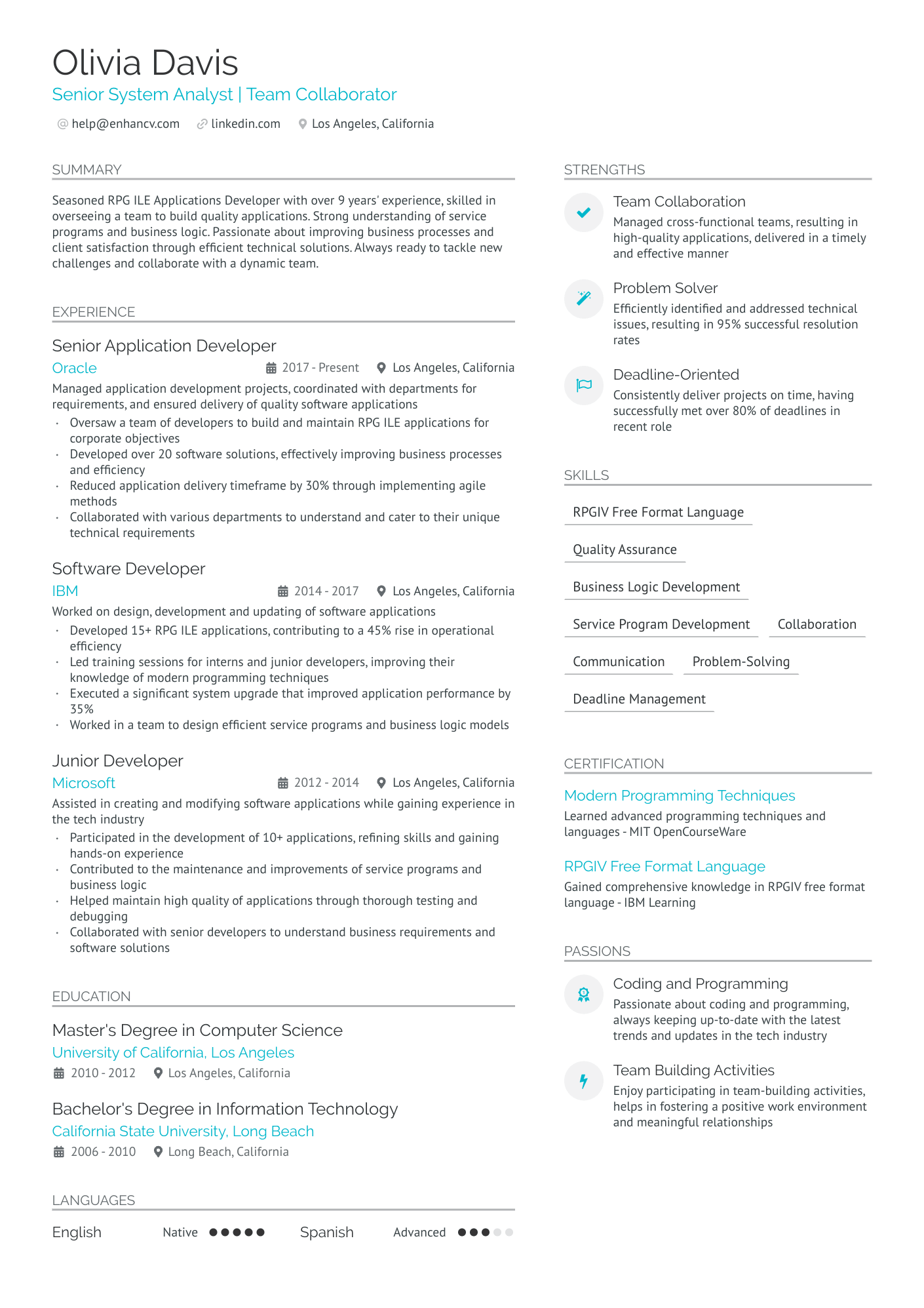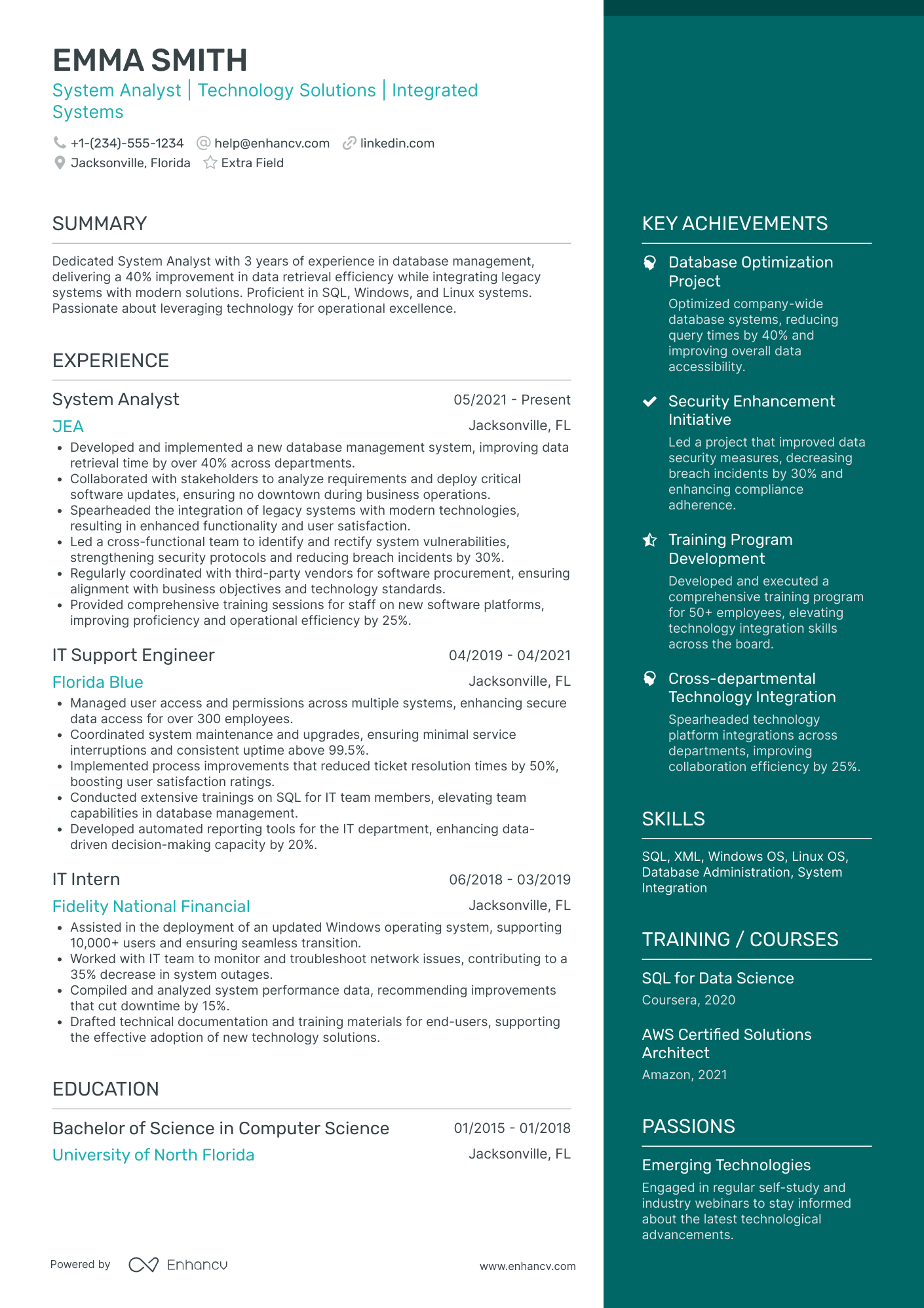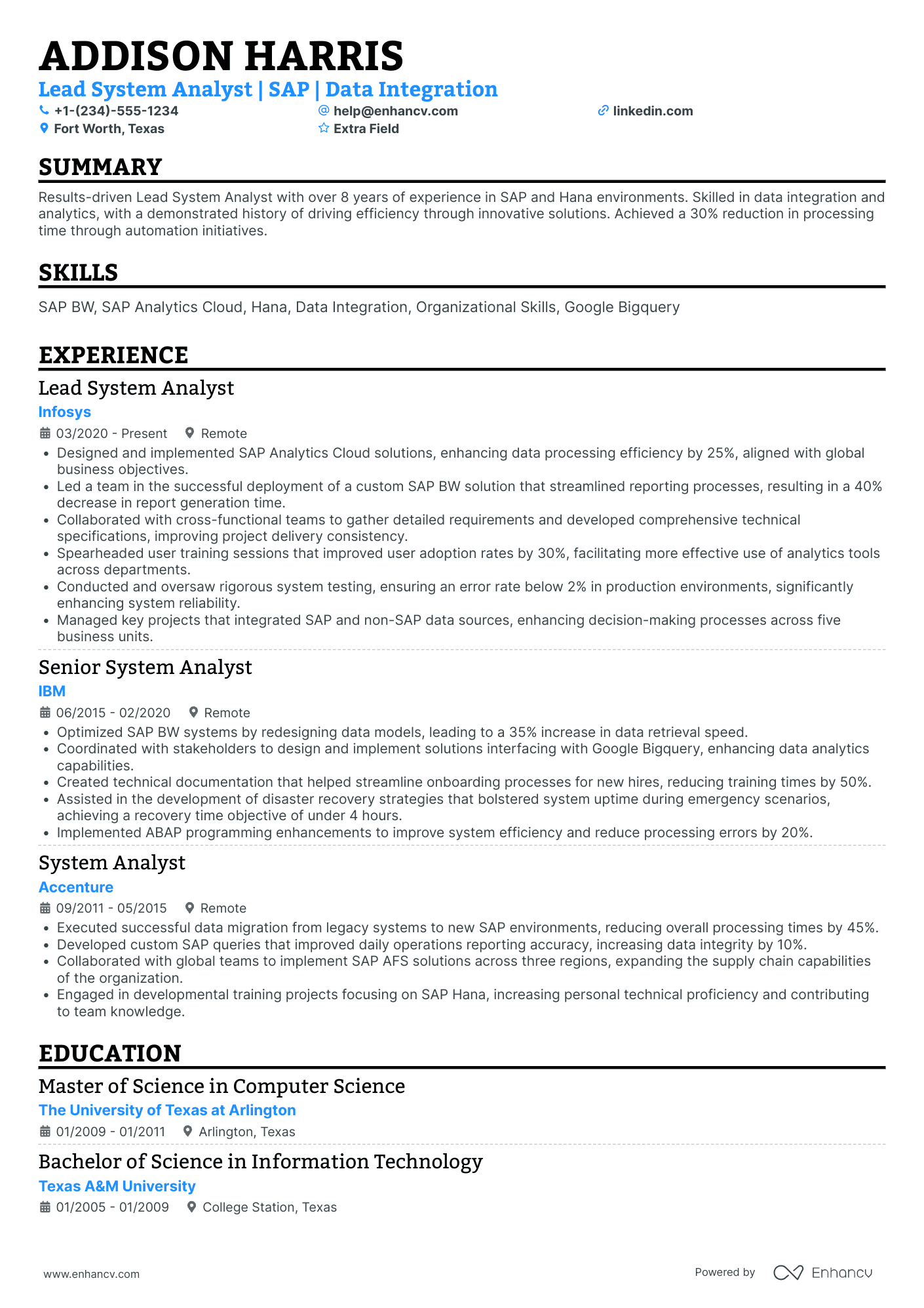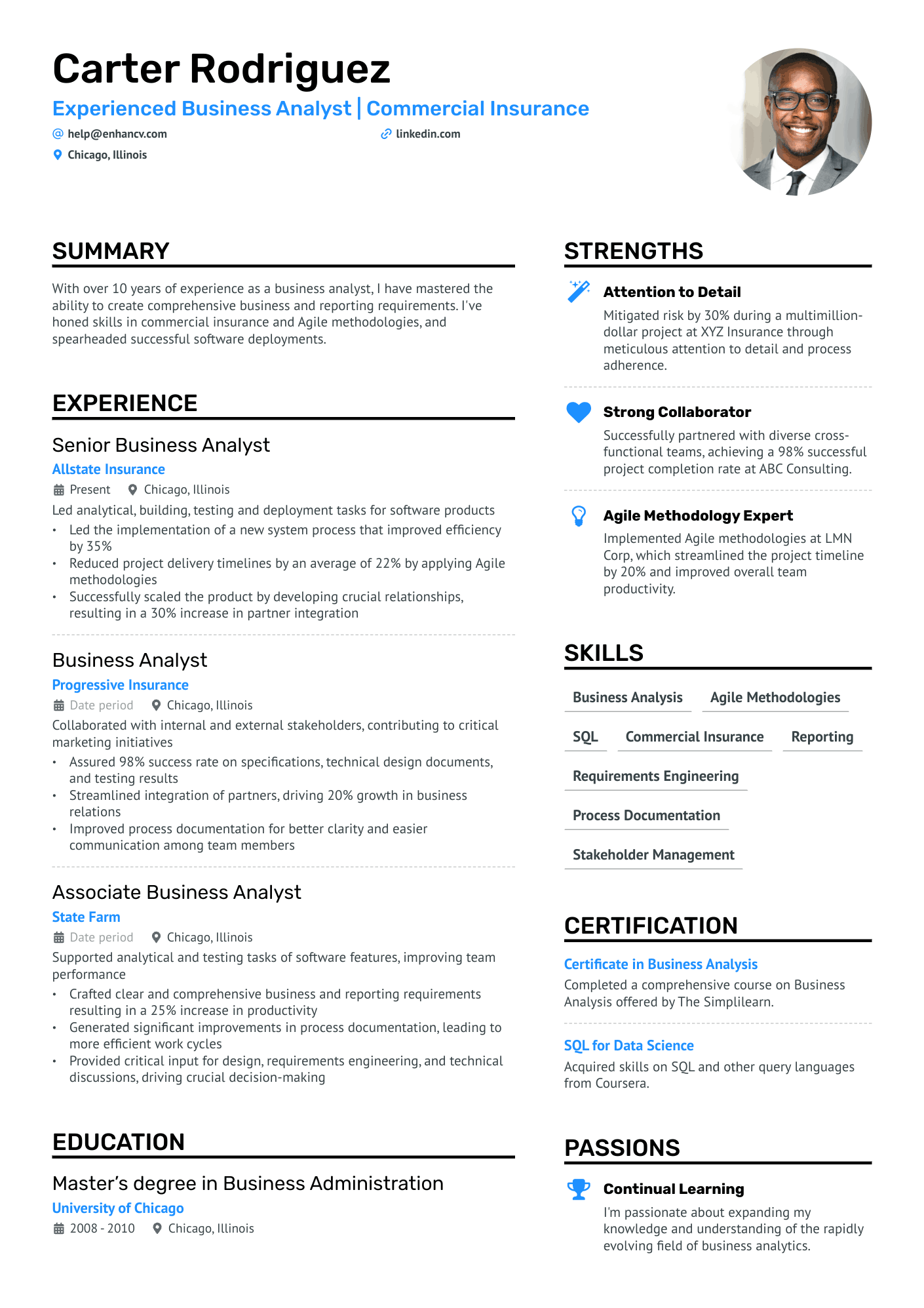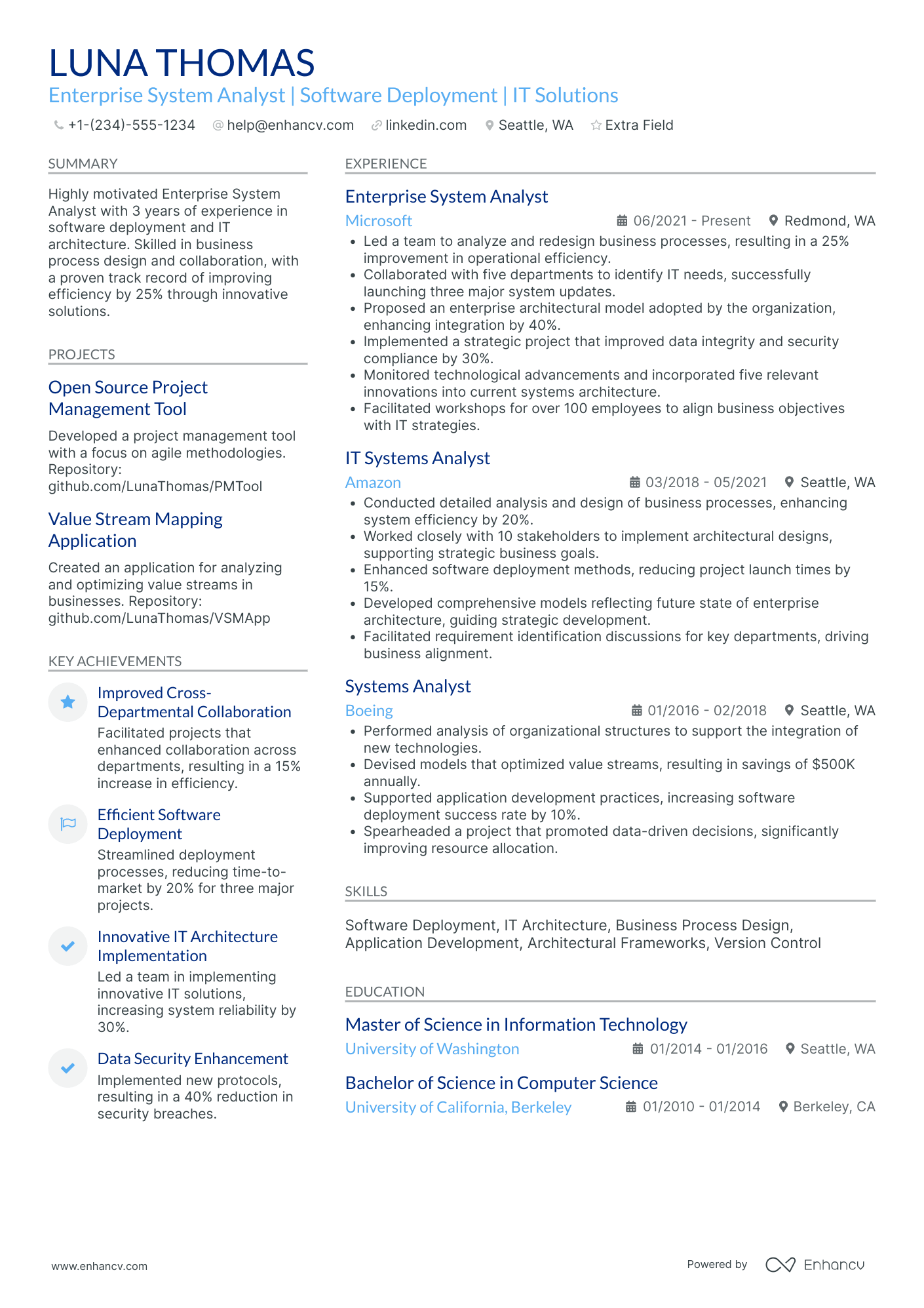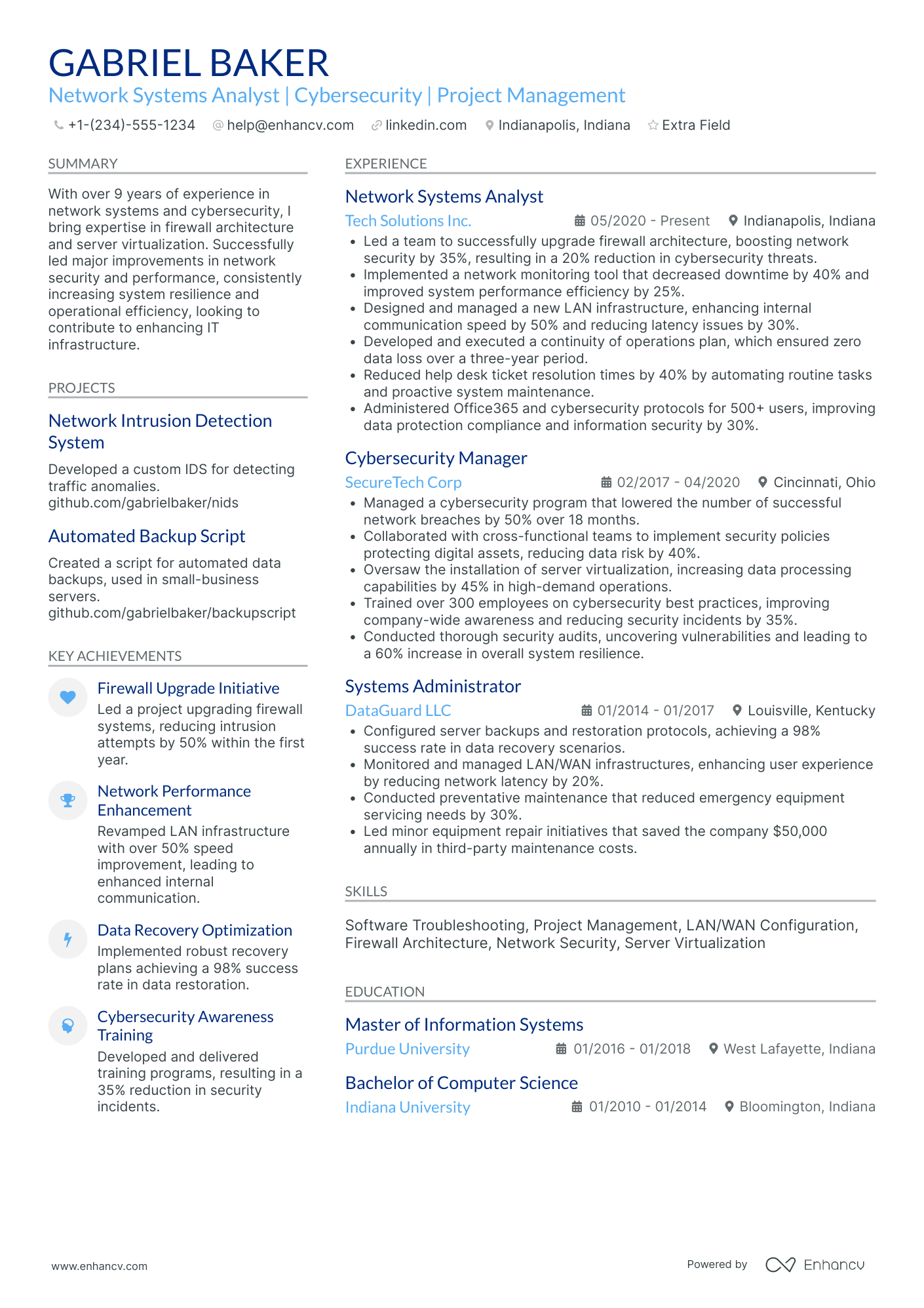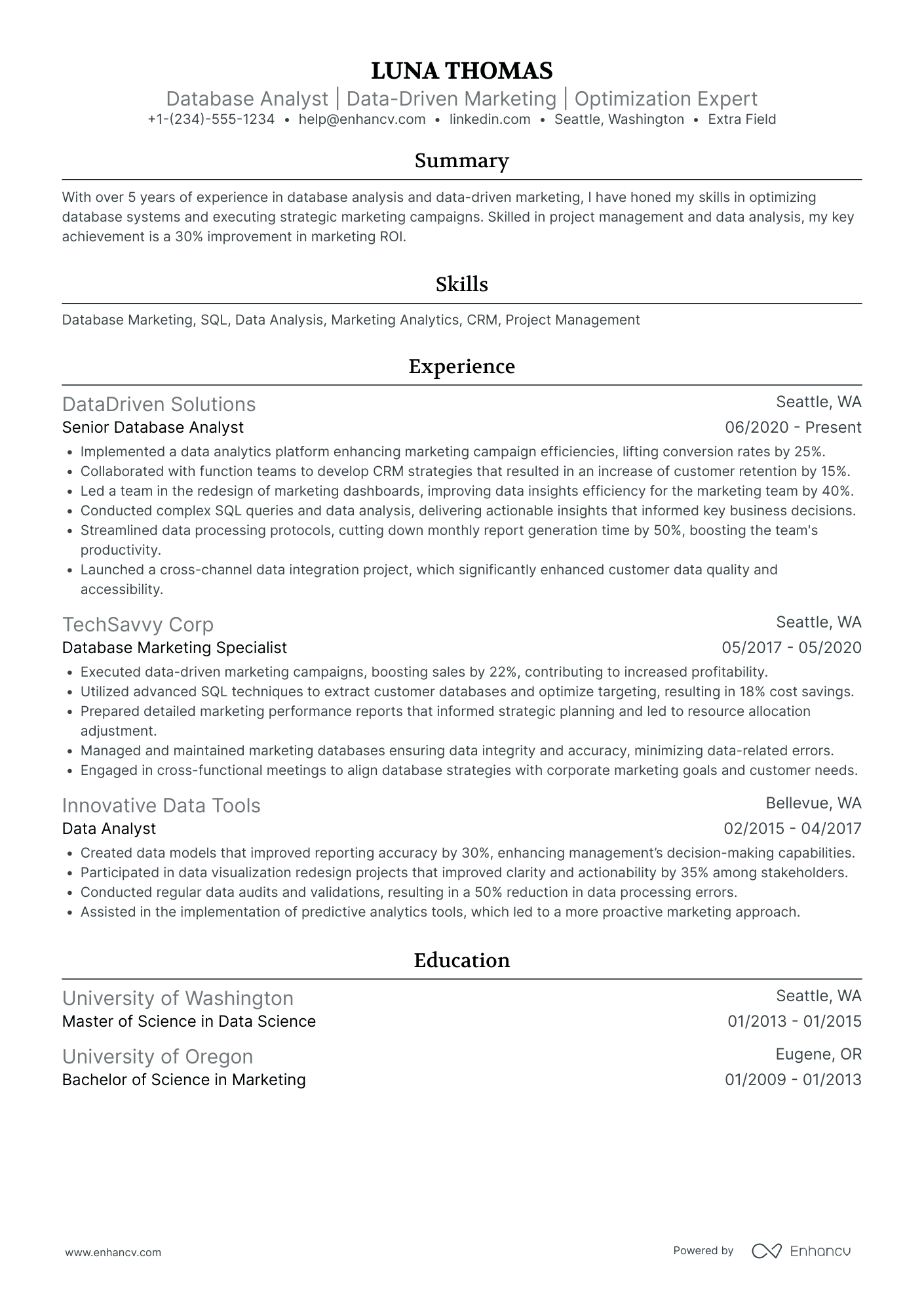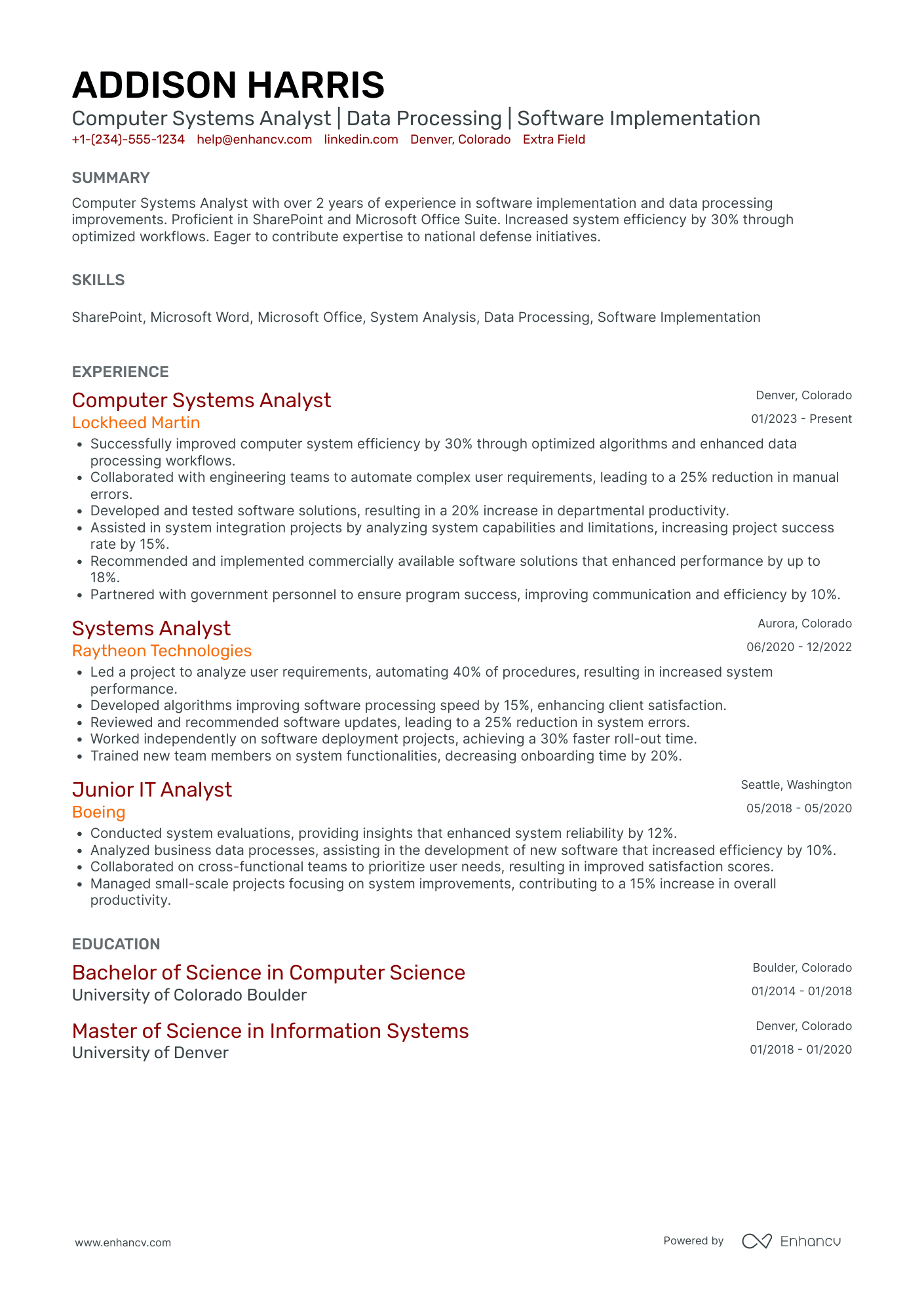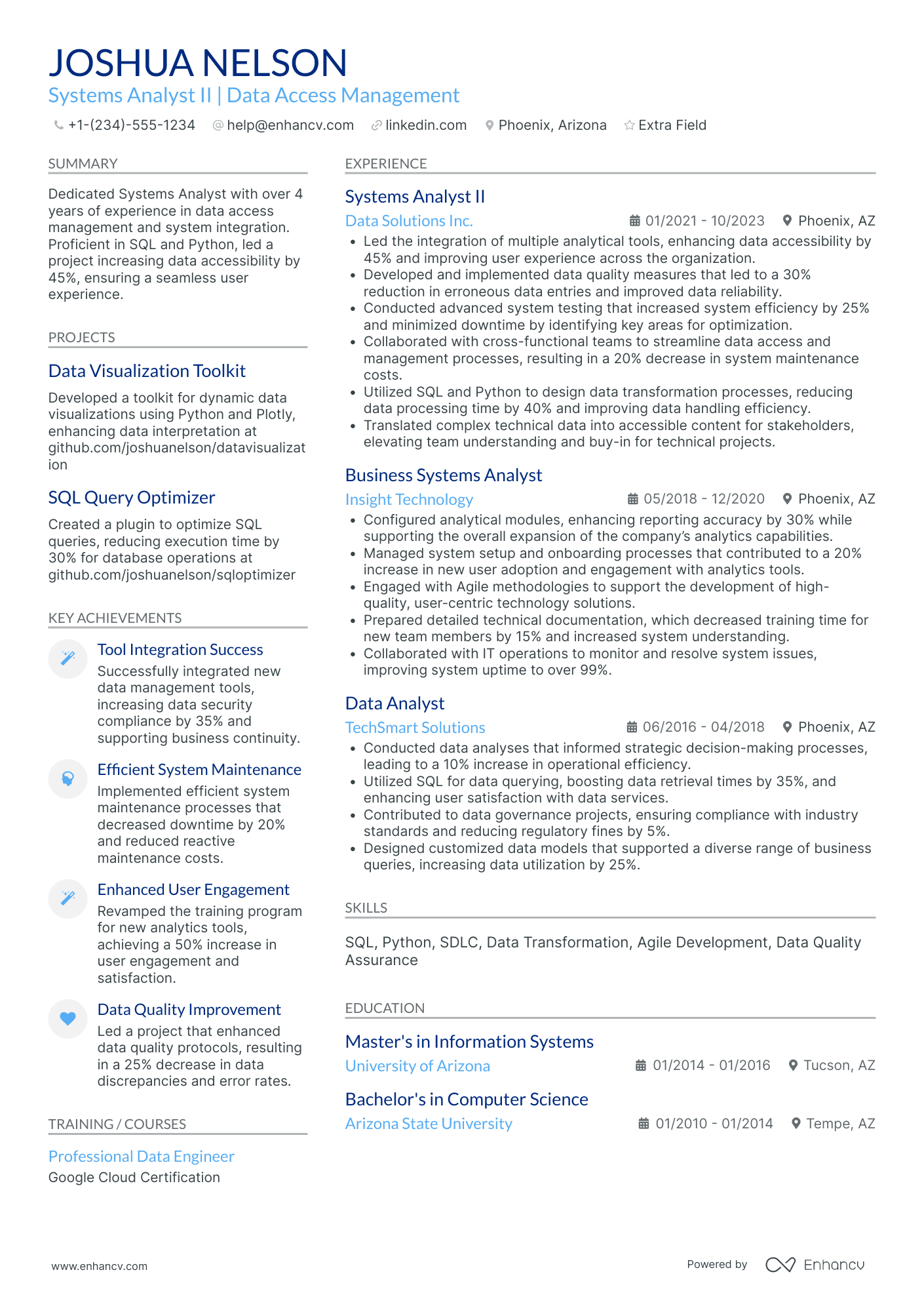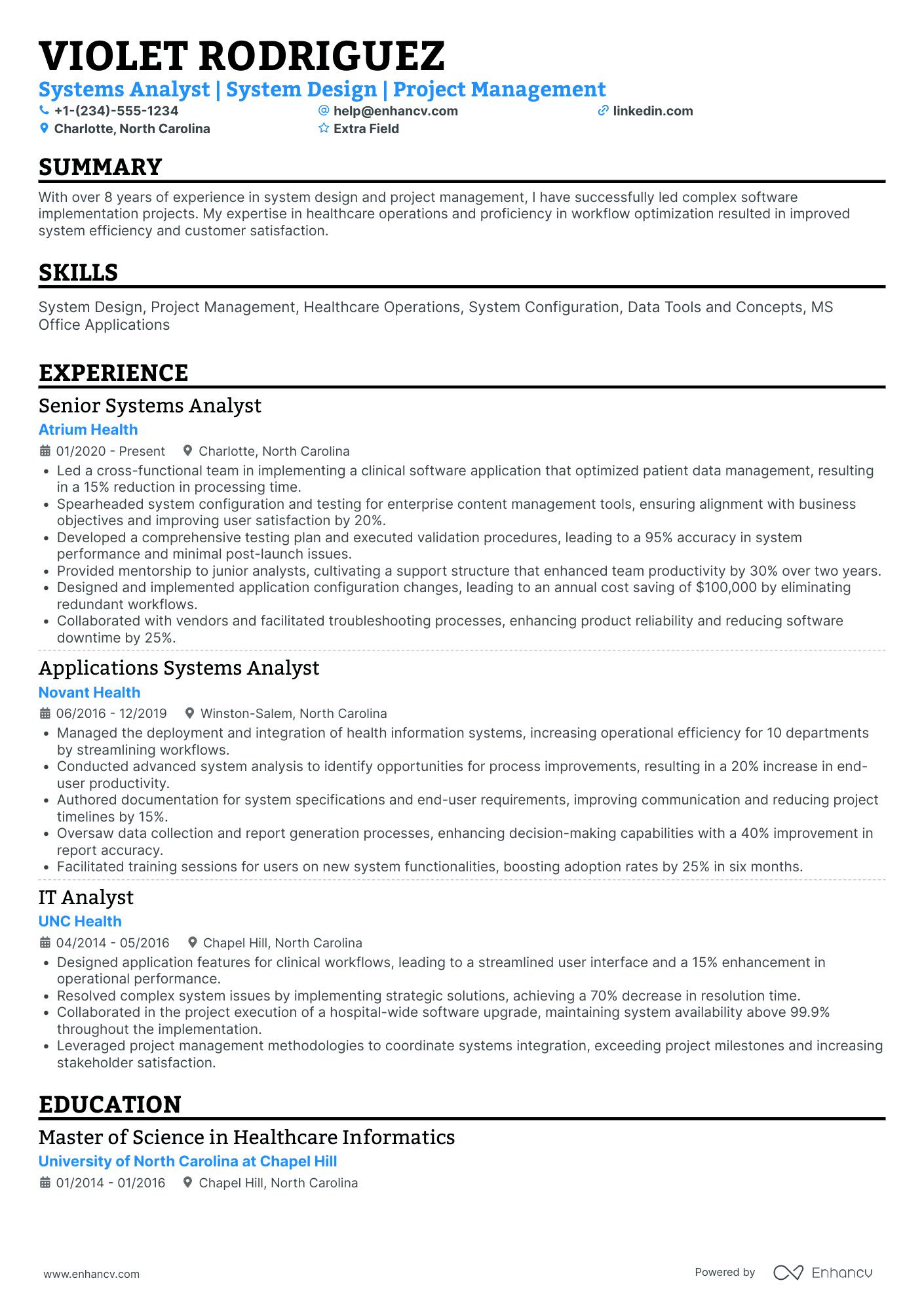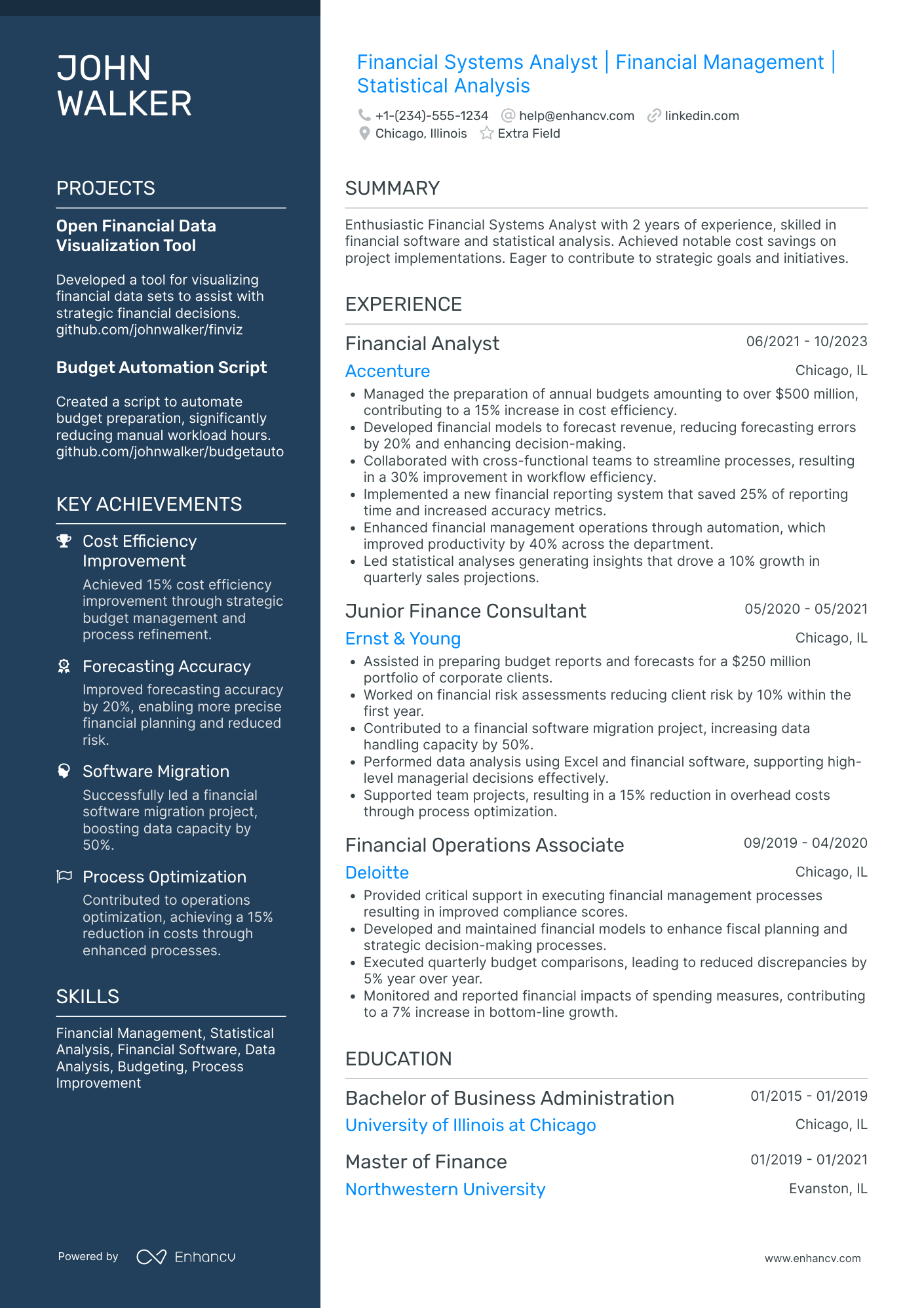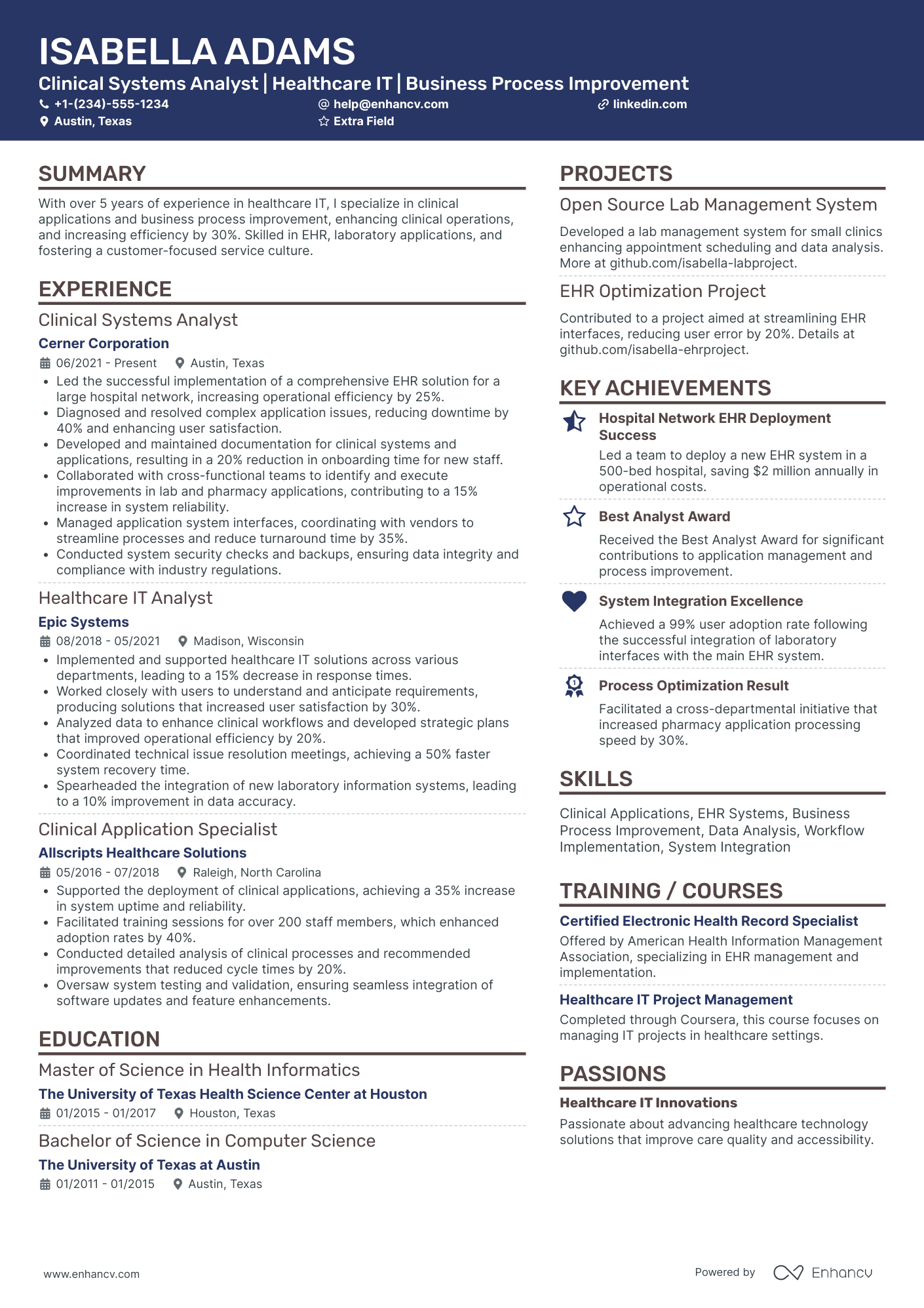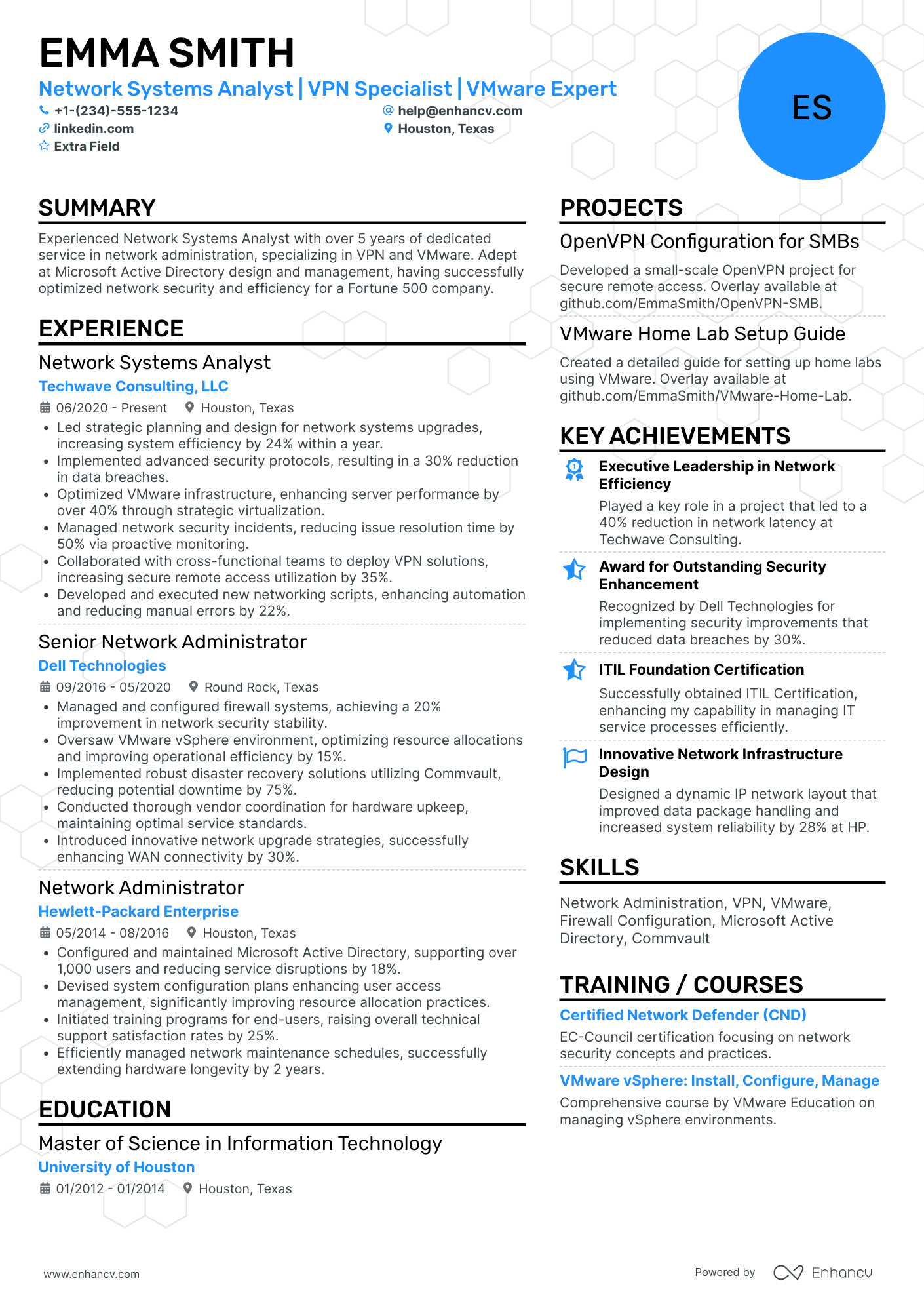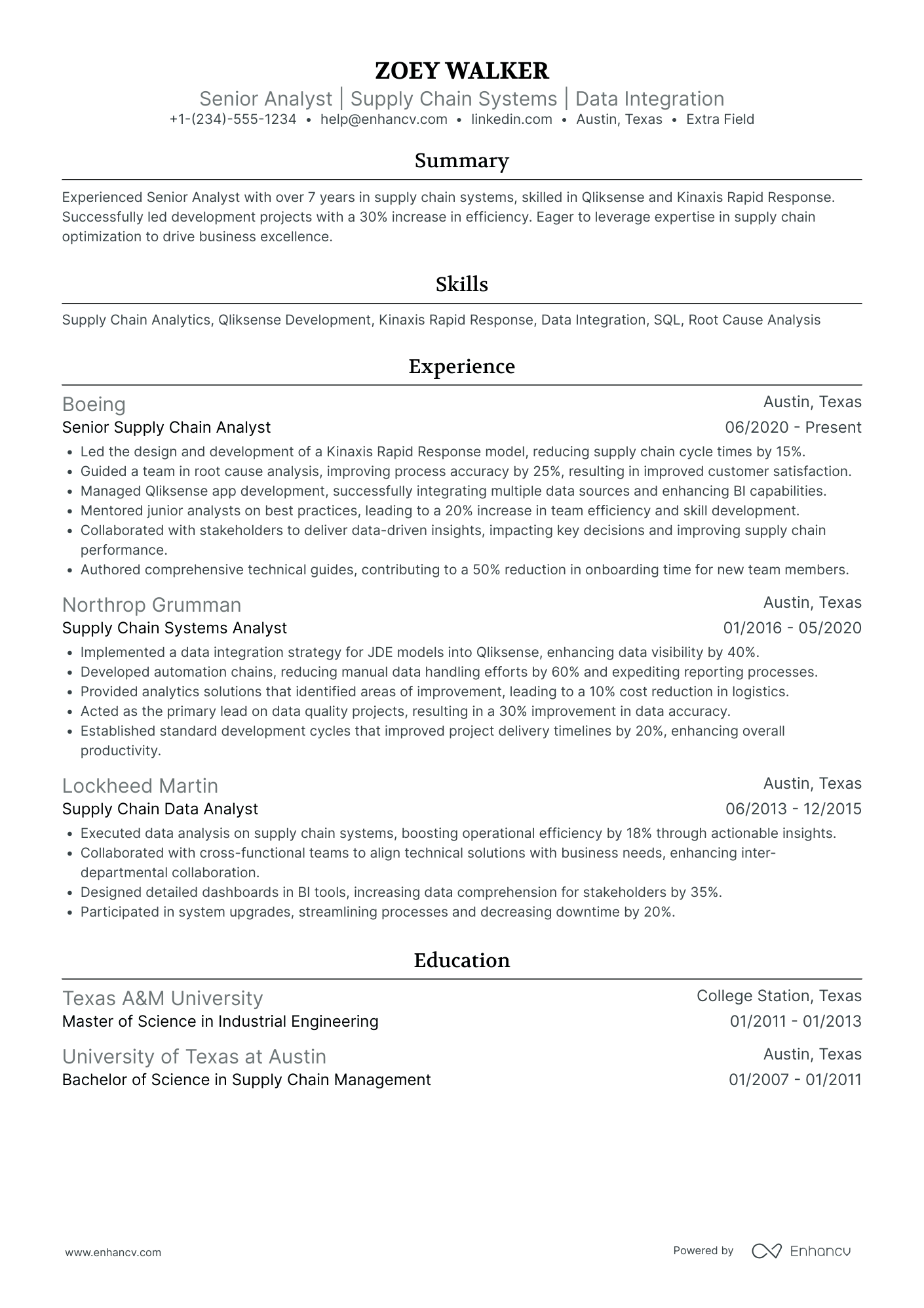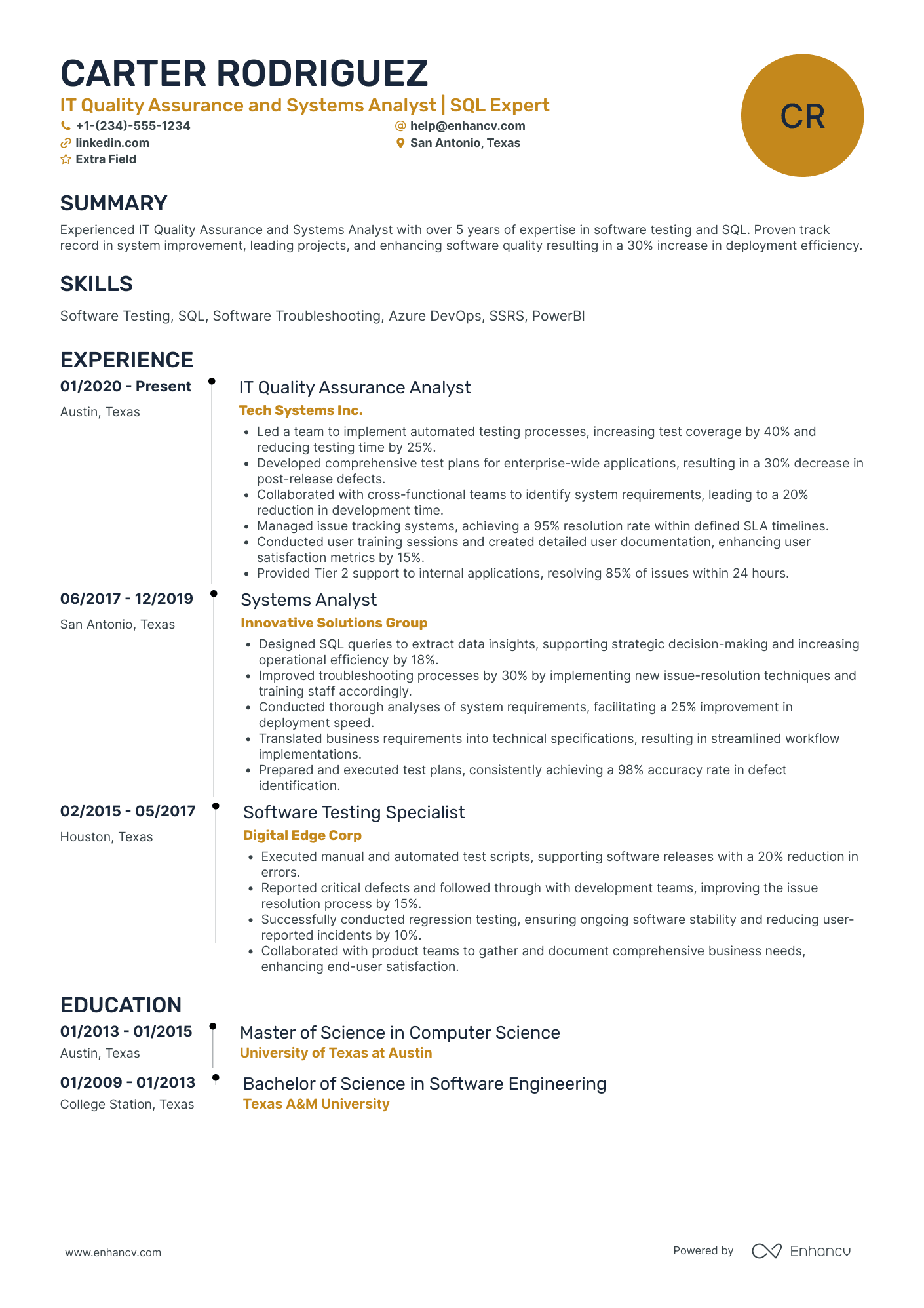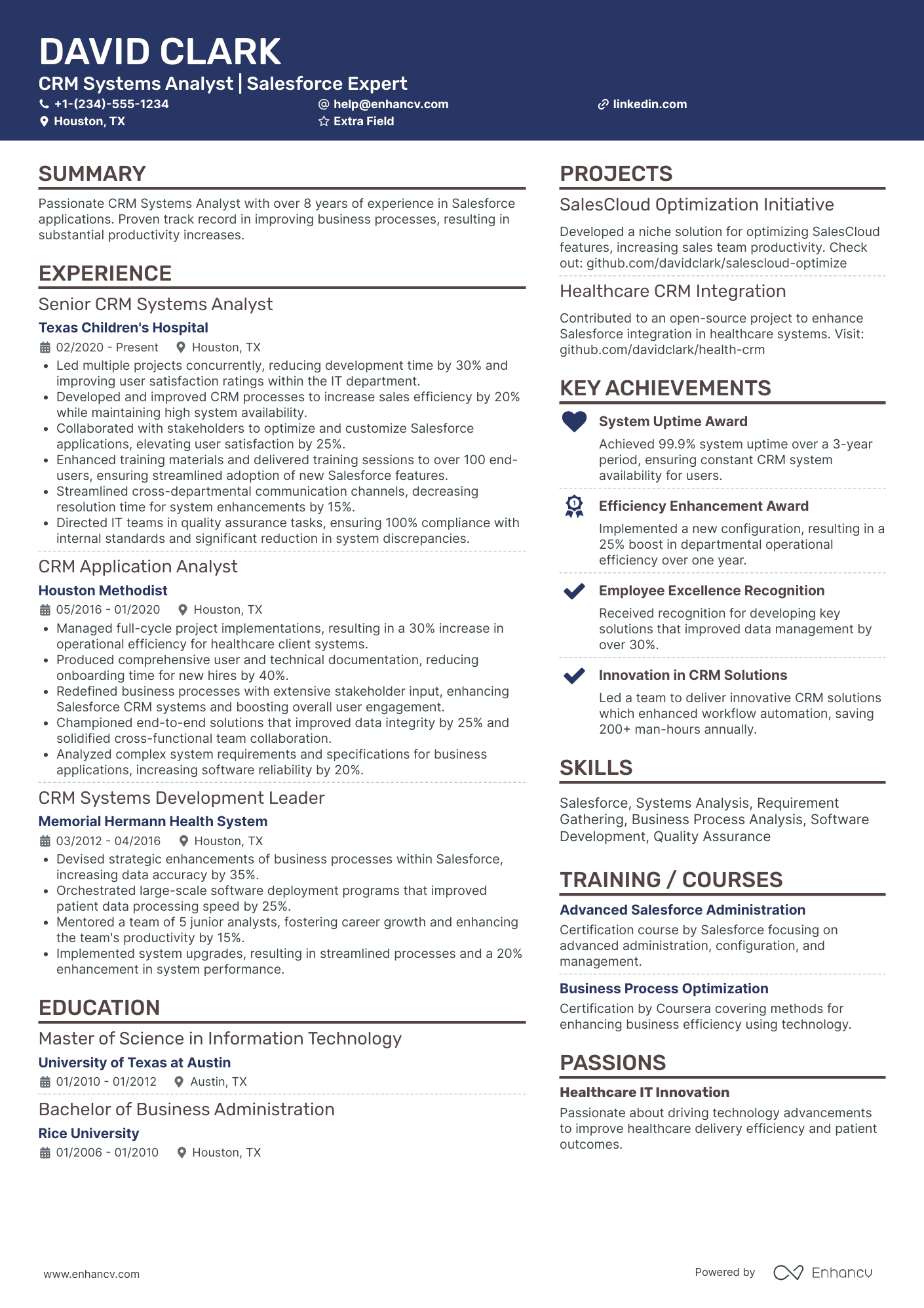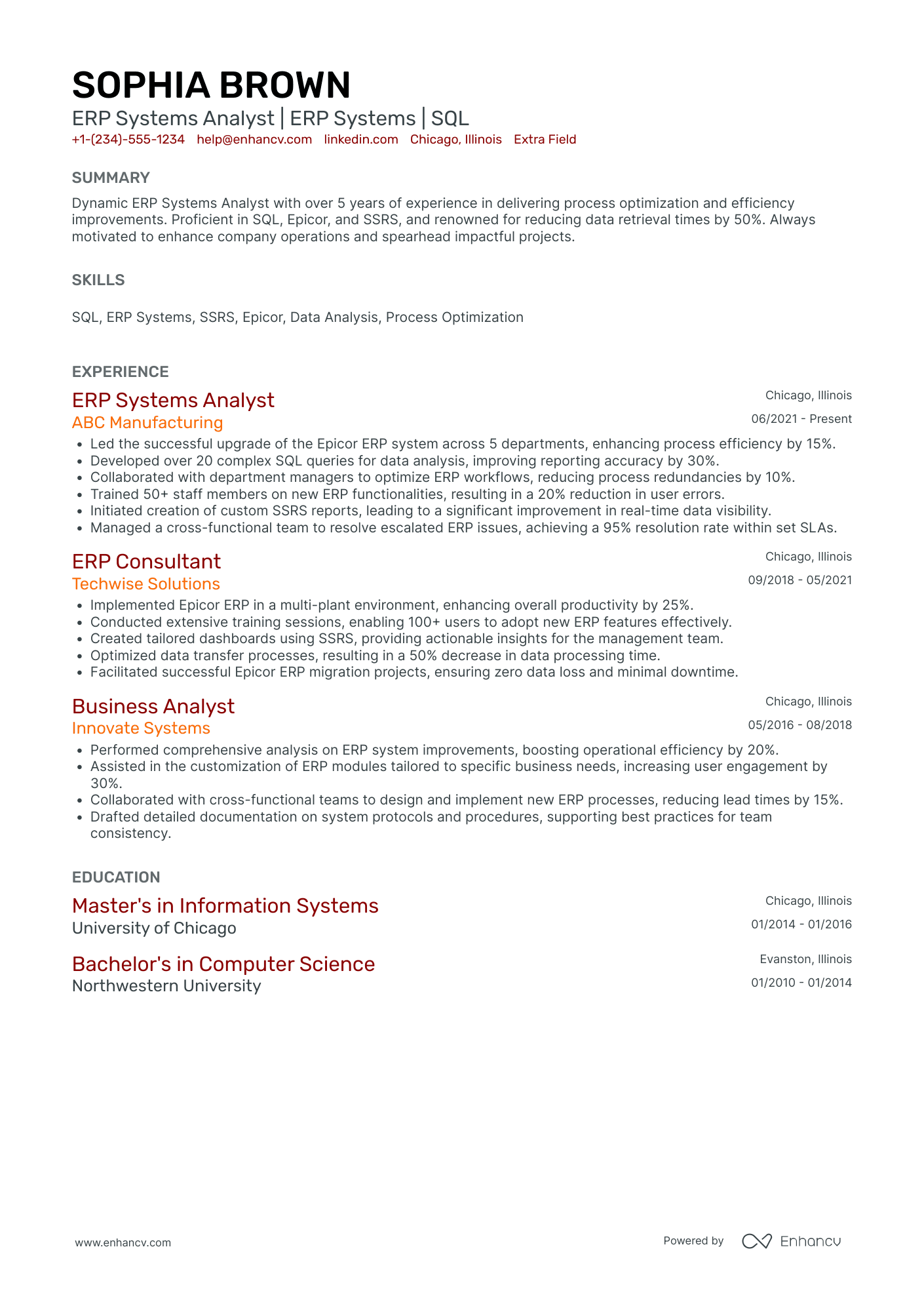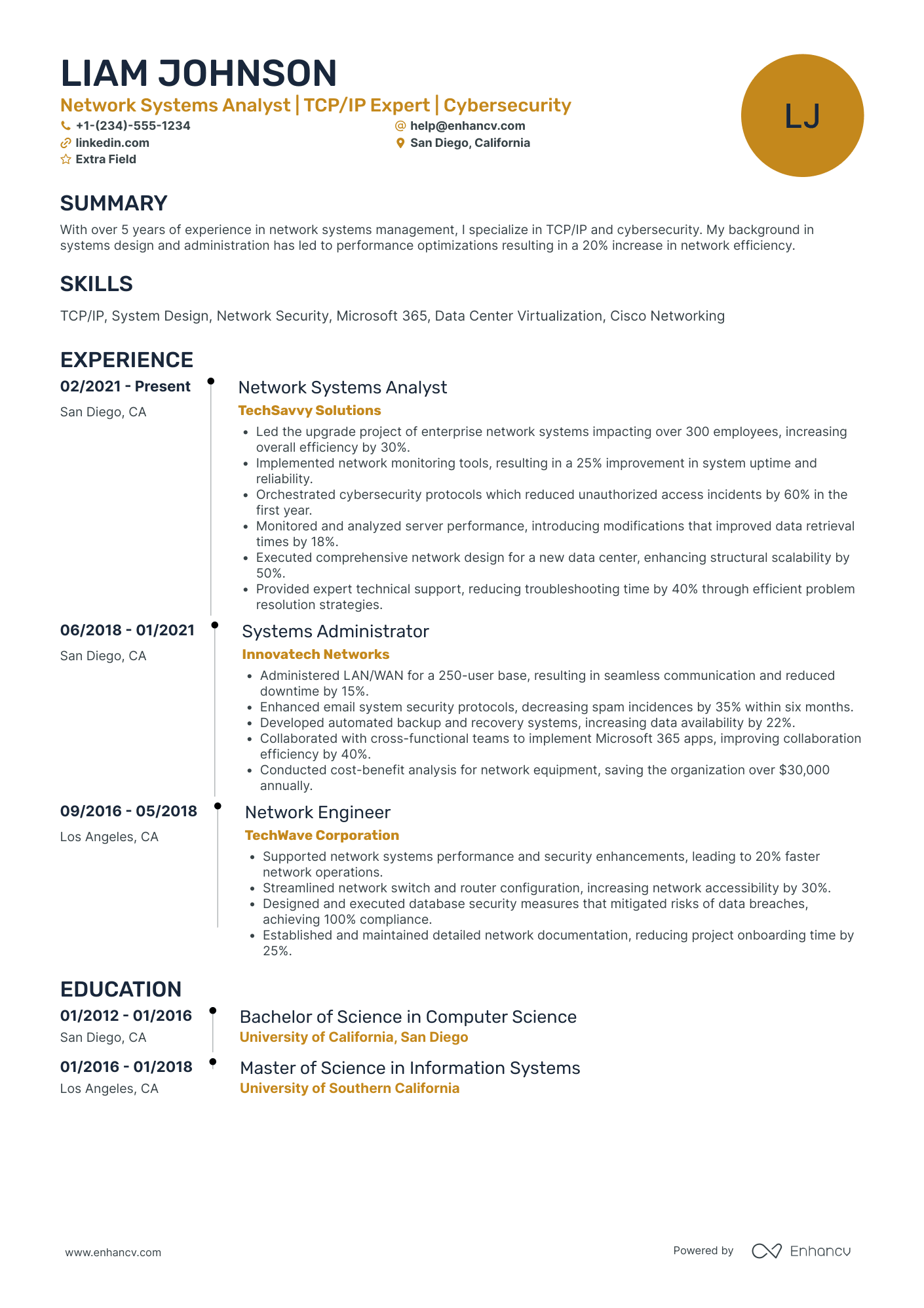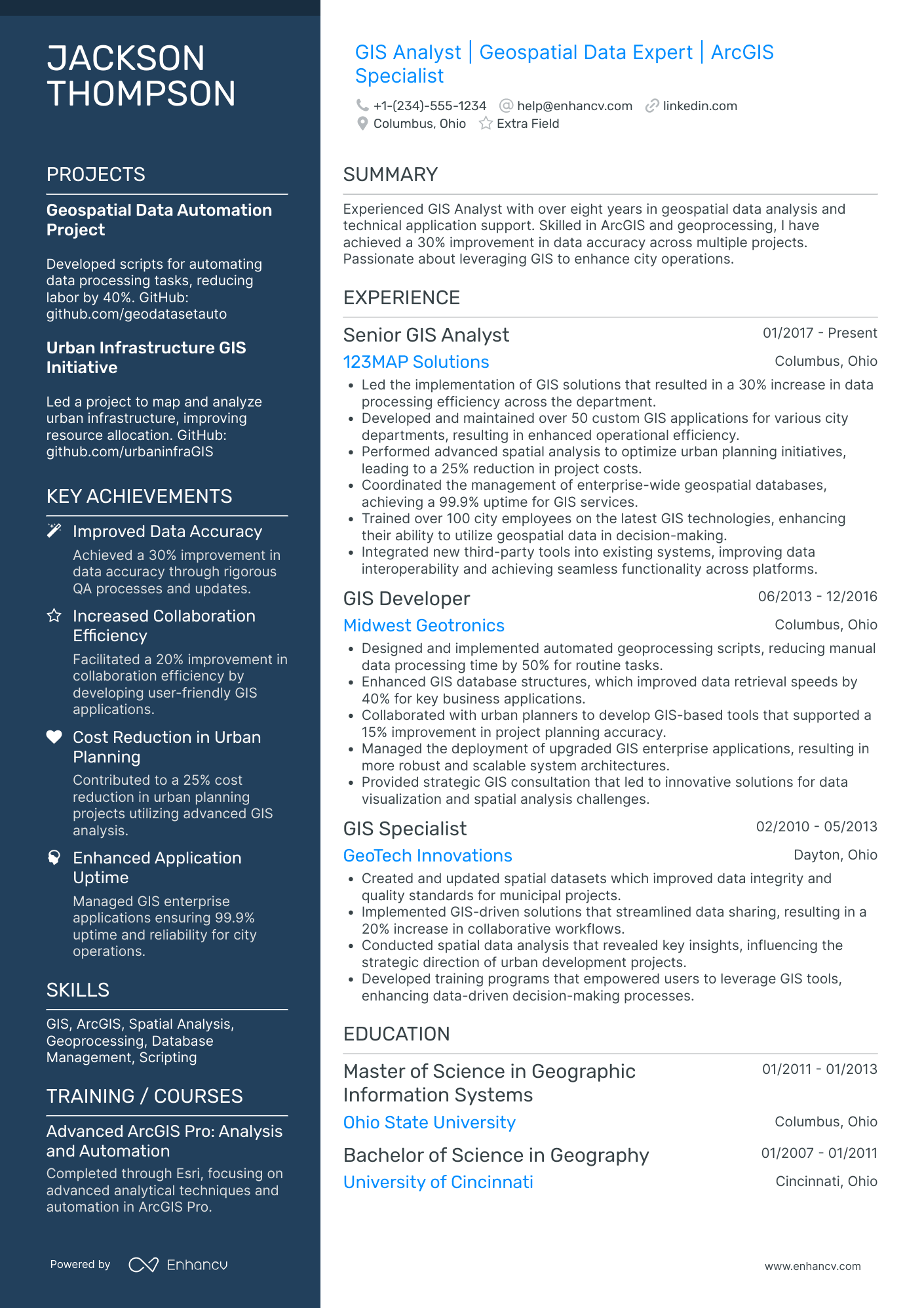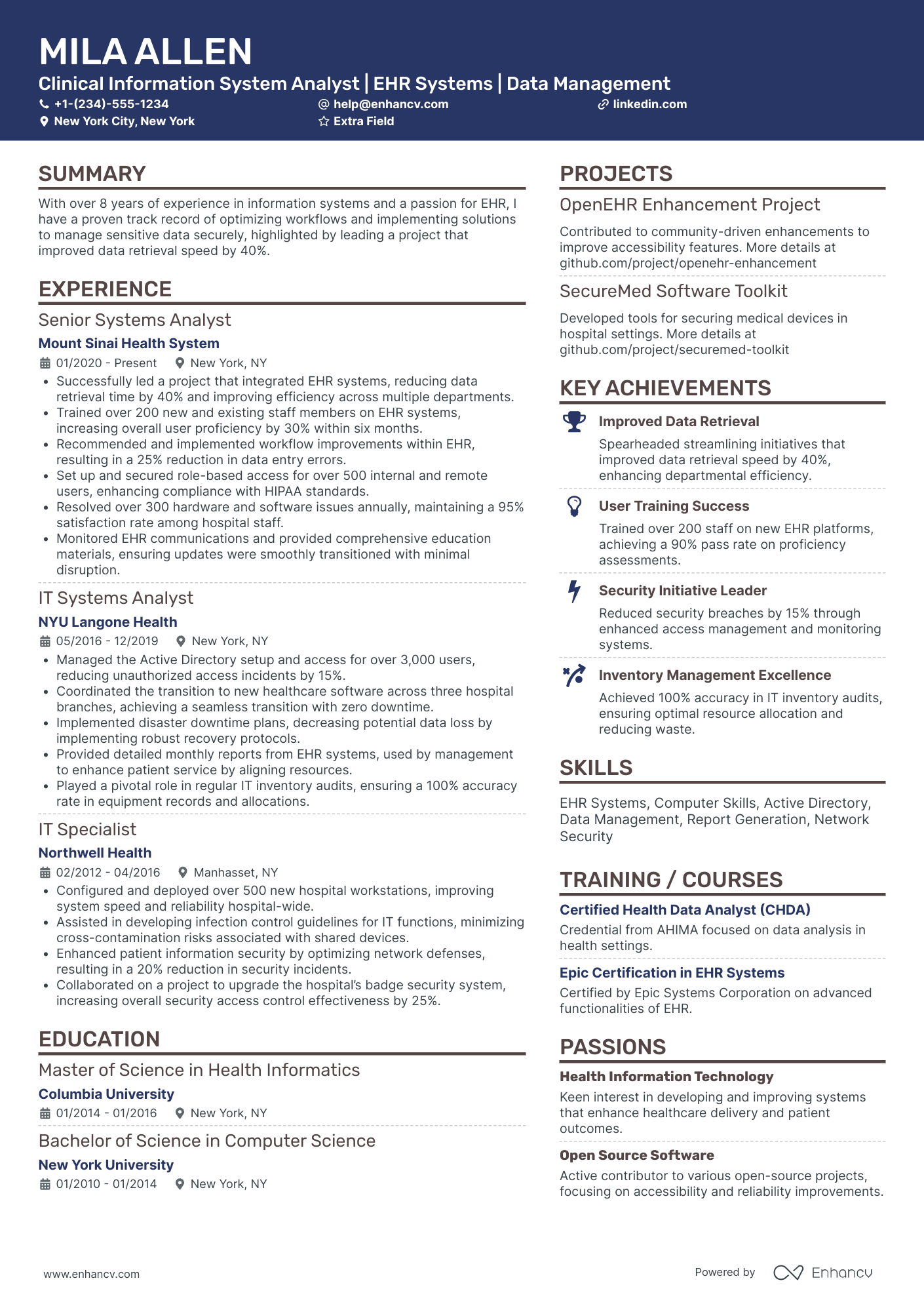Many system analyst resumes fail because they read like task logs and bury impact under tools and acronyms. A system analyst resume must show measurable business value fast, or it gets filtered by ATS rules and skimmed past in seconds.
A strong resume focuses on outcomes and decision support, not job duties. If you're unsure where to begin, learning how to write a resume that prioritizes impact is an essential first step. You should highlight reduced incident volume, improved requirements quality, shortened release cycles, delivered integrations across teams, raised uptime, and boosted adoption through clearer workflows.
Key takeaways
- Lead every experience bullet with a measurable outcome, not a task description.
- Use a reverse-chronological format if you have significant system analyst experience.
- Choose a hybrid format when switching careers or entering the field with limited experience.
- Tailor your resume to each job posting by mirroring its tools, terminology, and KPIs.
- Demonstrate skills in your summary and experience sections, not just in a skills list.
- Quantify achievements using metrics like cost savings, defect reduction, and delivery speed.
- Use Enhancv to turn routine responsibilities into concrete, recruiter-ready resume bullets.
How to format a system analyst" Both words are regular English words, so no capitalization changes are needed. system analyst resume
Recruiters hiring for a system analyst role prioritize evidence of requirements gathering, cross-functional collaboration, and the ability to translate business needs into technical solutions. Choosing the right resume format ensures these signals surface quickly during both automated screening and the initial human scan.
I have significant experience in this role—which format should I use?
Use a reverse-chronological format to showcase your deepening expertise in systems analysis and growing project scope. Do:
- Lead with your most recent positions and emphasize the scale of systems, stakeholders, and processes you owned.
- Highlight proficiency in role-specific tools and domains such as SQL, UML, ERP platforms, JIRA, and business process modeling.
- Quantify outcomes tied to efficiency gains, cost savings, or successful system implementations.
I'm junior or switching into this role—what format works best?
A hybrid format works best because it lets you lead with relevant analytical and technical skills while still showing a clear work history. Do:
- Place a focused skills section near the top featuring tools and competencies like SQL, data mapping, requirements documentation, and workflow diagramming.
- Include academic projects, internships, or cross-functional work that demonstrates systems thinking or process improvement.
- Connect every skill or project to a concrete action and a measurable or observable result.
Why not use a functional resume?
A functional format strips away the timeline and context recruiters need to evaluate how your analytical skills were applied in real work environments, making it harder to trust the depth of your experience. A functional resume might make sense if you're pivoting from a technical support or business operations role and have no direct system analyst job titles—but only if you anchor every listed skill to a specific project, outcome, or measurable result.
Once you've locked in a clean, readable format, the next step is filling it with the right sections that hiring managers expect to see on a system analyst resume.
What sections should go on a system analyst" Both words are regular English words, so no capitalization changes are needed. system analyst resume
Recruiters expect to see a system analyst resume that quickly shows how you analyze requirements, improve processes, and deliver reliable system outcomes. Understanding which resume sections to include and how to order them is key to making a strong impression.
Use this structure for maximum clarity:
- Header
- Summary
- Experience
- Skills
- Projects
- Education
- Certifications
- Optional sections: Awards, Publications, Languages
Strong experience bullets should emphasize measurable impact, business outcomes, system scope, and results delivered through analysis, documentation, and cross-functional execution.
Is your resume good enough?
Drop your resume here or choose a file. PDF & DOCX only. Max 2MB file size.
Now that you know which sections to include on your system analyst resume experience, the next step is learning how to write your system analyst resume so each section is clear, relevant, and easy to scan.
How to write your system analyst" Both words are regular English words, so no capitalization changes are needed. system analyst resume experience
Your experience section is where you prove you can do the work, not just describe it. Hiring managers reviewing system analyst resumes prioritize demonstrated impact—requirements you gathered that improved a system, processes you redesigned that reduced errors, platforms you helped implement—over generic task lists that read like a job description.
Each entry should include:
- Job title
- Company and location (or remote)
- Dates of employment (month and year)
Three to five concise bullet points showing what you owned, how you executed, and what outcomes you delivered:
- Ownership scope: the systems, applications, databases, or business processes you were directly accountable for analyzing, designing, or improving.
- Execution approach: the tools, frameworks, and methods you used—such as requirements elicitation techniques, data modeling tools, SQL, UML diagrams, or specific system development lifecycle methodologies—to drive decisions and deliver work.
- Value improved: changes you made to system performance, data accuracy, process efficiency, user accessibility, or operational reliability that moved a measurable needle for the organization.
- Collaboration context: how you worked across departments—partnering with developers, database administrators, business stakeholders, QA teams, or vendors—to translate business needs into technical specifications and working solutions.
- Impact delivered: outcomes framed as results rather than activities, showing the scale of systems you touched, the complexity of problems you solved, or the business value your analysis unlocked.
Every bullet should connect clearly to the system analyst role. Describe what you owned, how you executed it, and what changed because of your work. Strip out anything that doesn't reinforce your ability to analyze requirements, bridge business and technical teams, and deliver system solutions that work.
Experience bullet formula
A system analyst" Both words are regular English words, so no capitalization changes are needed. system analyst experience example
✅ Right example - modern, quantified, specific.
System Analyst
NorthBridge Health | Remote
2022–Present
Supported a multi-state healthcare network running Epic-integrated scheduling, billing, and patient portal systems for 1.2M annual patient visits.
- Led end-to-end requirements discovery and documentation (user stories, process maps, acceptance criteria) for a referral automation program, cutting referral-to-appointment cycle time by 28%.
- Modeled current-state and future-state workflows in Visio and BPMN, eliminating eight manual handoffs and reducing scheduling errors by 19% across three service lines.
- Partnered with product managers, UX designers, and engineers to define API and integration requirements, improving HL7 interface success rates from 96.1% to 99.4% and reducing incident volume by 22%.
- Built SQL-based data validation queries and UAT test plans in Azure DevOps, increasing first-pass UAT approvals from 62% to 85% and shortening release stabilization by nine days.
- Facilitated stakeholder workshops and change control governance, aligning compliance, operations, and IT on scope and risk, and preventing an estimated $310K in rework from late-stage requirement changes.
Now that you have a strong experience example as a foundation, let's focus on tailoring your system analyst resume experience to match the specific job you're applying for.
How to tailor your system analyst" Both words are regular English words, so no capitalization changes are needed. system analyst resume experience
Recruiters evaluate system analyst resumes through a combination of human review and applicant tracking systems (ATS). Tailoring your resume to the job description increases your chances of passing both.
Ways to tailor your system analyst experience:
- Match the specific tools and platforms named in the job description.
- Mirror the exact terminology used for methodologies like Agile or SDLC.
- Reflect the KPIs or performance benchmarks the posting highlights.
- Include relevant industry or domain experience the role requires.
- Emphasize system security or compliance standards when they're mentioned.
- Align your work with the collaboration models or team structures described.
- Reference the same integration frameworks or data migration processes listed.
- Highlight reliability or uptime goals that appear in the posting.
Tailoring means aligning your real accomplishments with what the role demands—not forcing keywords where they don't belong.
Resume tailoring examples for system analyst" Both words are regular English words, so no capitalization changes are needed. system analyst
| Job description excerpt | Untailored | Tailored |
|---|---|---|
| "Gather and document business requirements using structured interviews and process modeling to support ERP implementation projects." | Collected requirements from stakeholders for various IT projects. | Conducted structured interviews with cross-functional stakeholders and created BPMN process models to define business requirements for a company-wide SAP ERP implementation across three departments. |
| "Analyze existing system workflows, identify inefficiencies, and recommend solutions that reduce processing time and improve data accuracy." | Helped improve system processes and worked on data quality initiatives. | Mapped 12 end-to-end system workflows using Visio, identified redundant data entry points, and proposed automation fixes that cut invoice processing time by 35% and reduced data errors by 20%. |
| "Collaborate with developers and QA teams to translate functional requirements into technical specifications and support UAT cycles." | Worked with technical teams to support software development and testing. | Translated 40+ functional requirements into detailed technical specifications for the development team and coordinated two UAT cycles with eight business users, resolving 95% of defects before go-live. |
Once you tailor your system analyst resume experience to the role, quantify your system analyst achievements to show the impact of that work.
How to quantify your system analyst" Both words are regular English words, so no capitalization changes are needed. system analyst achievements
Numbers prove your changes improved systems, not just documentation. Focus on performance, reliability, defect rates, delivery speed, cost savings, security risk reduction, and user adoption across releases, integrations, and incident response. For more guidance on quantifying achievements, see how other professionals turn routine work into compelling metrics.
Quantifying examples for system analyst" Both words are regular English words, so no capitalization changes are needed. system analyst
| Metric | Example |
|---|---|
| Response time | "Reduced API response time from 900 ms to 350 ms by tuning SQL indexes and caching in AWS, improving peak-hour throughput by 40%." |
| Incident volume | "Cut Sev-1 incidents from eight to two per quarter by adding monitoring in Datadog and tightening alert thresholds and runbooks." |
| Defect leakage | "Lowered post-release defects by 30% by improving requirements traceability in Jira and adding acceptance criteria and test cases." |
| Delivery speed | "Shortened change request cycle time from fourteen to nine days by streamlining approvals and automating status updates in ServiceNow." |
| Cost savings | "Saved $120,000 annually by decommissioning two legacy integrations and consolidating ETL jobs into a single Azure Data Factory pipeline." |
Turn your everyday tasks into measurable, recruiter-ready resume bullets in seconds with Enhancv's Bullet Point Generator.
With strong bullet points in place, the next step is ensuring your resume highlights the right mix of hard and soft skills that hiring managers expect from a system analyst.
How to list your hard and soft skills on a system analyst" Both words are regular English words, so no capitalization changes are needed. system analyst resume
Your skills section shows recruiters and applicant tracking systems (ATS) that you can translate business needs into reliable systems, and it helps them match you to requirements fast—aim for a balanced mix of role-specific hard skills and execution-focused soft skills.
system analyst roles require a blend of:
- Product strategy and discovery skills.
- Data, analytics, and experimentation skills.
- Delivery, execution, and go-to-market discipline.
- Soft skills.
Your skills section should be:
- Scannable (bullet-style grouping).
- Relevant to the job post.
- Backed by proof in experience bullets.
- Updated with current tools.
Place your skills section:
- Above experience if you're junior or switching careers.
- Below experience if you're mid/senior with strong achievements.
Hard skills
- Requirements elicitation, workshops
- Business process modeling, BPMN
- User stories, acceptance criteria
- Use cases, functional specifications
- Data modeling, ERD
- SQL querying, joins, CTEs
- API analysis, REST, JSON
- Integration mapping, ETL, EDI
- Jira, Confluence
- Visio, Lucidchart
- UAT planning, defect triage
- SDLC, Agile, Scrum
Soft skills
- Translate business needs to specs
- Ask clarifying, risk-focused questions
- Facilitate cross-functional alignment
- Write clear, testable requirements
- Prioritize scope with tradeoffs
- Manage stakeholders and expectations
- Communicate impact and dependencies
- Drive decisions with data and context
- Coordinate handoffs across teams
- Own follow-through to closure
- Handle ambiguity with structure
- Negotiate solutions under constraints
How to show your system analyst" Both words are regular English words, so no capitalization changes are needed. system analyst skills in context
Skills shouldn't live only in a dedicated skills list. You can explore a full list of resume skills to identify additional competencies worth highlighting.
They should be demonstrated in:
- Your summary (high-level professional identity)
- Your experience (proof through outcomes)
Here's what that looks like in practice.
Summary example
Senior system analyst with 10 years in healthcare IT, specializing in EHR integration, requirements engineering, and cross-functional stakeholder collaboration. Led a system migration that reduced claim processing errors by 34%.
Why it works:
- States senior-level experience clearly
- Names domain-specific tools and methods
- Includes a measurable outcome
- Signals collaboration as a soft skill
Experience example
System Analyst III
Meridian Health Solutions | Remote
June 2019–April 2024
- Gathered and documented business requirements across 12 clinical departments, reducing project scope revisions by 28% through structured stakeholder workshops.
- Designed data flow diagrams and process models in Visio and Lucidchart, accelerating UAT cycles by three weeks per release.
- Partnered with developers and QA engineers to validate SQL-based reporting queries, improving dashboard accuracy to 99.2%.
Why it works:
- Every bullet includes measurable proof
- Skills appear naturally within achievements
Once you’ve shown your system analyst skills in context, you can apply the same approach to writing a system analyst resume with no experience.
How do I write a system analyst" Both words are regular English words, so no capitalization changes are needed. system analyst resume with no experience
Even without full-time experience, you can demonstrate readiness through:
- capstone system analyst project
- internship in business operations
- requirements gathering class project
- process mapping volunteer work
- data analysis coursework deliverables
- personal automation and reporting project
- case study portfolio for systems
If you're starting out, our guide on building a resume without work experience walks you through how to position academic projects and transferable skills effectively.
Focus on:
- requirements artifacts and traceability
- process maps and gap analysis
- data queries and reporting outputs
- system analyst project results metrics
Resume format tip for entry-level system analyst
Use a hybrid resume format, because it puts system analyst projects and relevant skills first while still showing education and any work history. Do:
- Lead with a projects section.
- Add a skills section with tools.
- Quantify outcomes in each bullet.
- Mirror system analyst keywords from postings.
- Attach links to project artifacts.
- Built a system analyst capstone by mapping an order-to-cash process in Visio, writing ten requirements, and reducing simulated cycle time by 18% in a redesigned workflow.
Even if you're light on professional experience, a well-presented education section can demonstrate the technical foundation employers look for in a system analyst.
How to list your education on a system analyst" Both words are regular English words, so no capitalization changes are needed. system analyst resume
Your education section helps hiring managers confirm you have the analytical and technical foundation a system analyst role demands. It signals relevant training in areas like systems design, databases, and business process modeling.
Include:
- Degree name
- Institution
- Location
- Graduation year
- Relevant coursework (for juniors or entry-level candidates)
- Honors & GPA (if 3.5 or higher)
Skip month and day details—list the graduation year only.
Here's a strong education entry for a system analyst resume:
Example education entry
Bachelor of Science in Information Systems
University of Wisconsin–Milwaukee, Milwaukee, WI
Graduated 2021
GPA: 3.7/4.0
- Relevant coursework: Systems Analysis & Design, Database Management, Business Process Modeling, Network Architecture
- Honors: Dean's List (six semesters), Magna Cum Laude
How to list your certifications on a system analyst" Both words are regular English words, so no capitalization changes are needed. system analyst resume
Certifications show your commitment to learning, prove tool proficiency, and signal industry relevance on a system analyst resume. They also help validate specialized skills when your work history does not cover every system or methodology.
Include:
- Certificate name
- Issuing organization
- Year
- Optional: credential ID or URL
- Place certifications below education when they are older, less relevant, or you want your degree to lead your system analyst resume.
- Place certifications above education when they are recent, highly relevant, or required for the system analyst role you want.
Best certifications for your system analyst" Both words are regular English words, so no capitalization changes are needed. system analyst resume
- ITIL 4 Foundation
- Certified Business Analysis Professional (CBAP)
- PMI Professional in Business Analysis (PMI-PBA)
- Certified Associate in Project Management (CAPM)
- Microsoft Certified: Azure Fundamentals
- AWS Certified Cloud Practitioner
- Certified Information Systems Auditor (CISA)
With your certifications listed to validate your technical qualifications, you can now write your system analyst resume summary to quickly show how those credentials support the role you’re targeting.
How to write your system analyst" Both words are regular English words, so no capitalization changes are needed. system analyst resume summary
Your resume summary is the first thing a recruiter reads. A strong one instantly signals your fit for the role and sets the tone for everything below.
Keep it to three to four lines, with:
- Your title and total years of experience in systems analysis.
- The domain or industry you've worked in, such as healthcare, finance, or ERP systems.
- Core tools and skills like SQL, business process modeling, or requirements gathering.
- One or two measurable achievements that show your impact.
- Soft skills tied to real outcomes, such as cross-team collaboration that shortened project timelines.
PRO TIP
At the entry or mid level, lead with your technical skills and the tools you know well. Highlight early wins that show you can translate business needs into system requirements. Avoid vague phrases like "passionate problem solver" or "motivated team player." Instead, tie every claim to something concrete—a project delivered, a process improved, or a defect rate reduced.
Example summary for a system analyst" Both words are regular English words, so no capitalization changes are needed. system analyst
System analyst with three years of experience in healthcare IT. Skilled in SQL, Visio, and requirements documentation. Reduced data migration errors by 30% through improved validation workflows across two ERP implementations.
Optimize your resume summary and objective for ATS
Drop your resume here or choose a file.
PDF & DOCX only. Max 2MB file size.
With a strong summary in place, you'll want to make sure your header presents your name and contact details clearly so recruiters can reach you without any friction.
What to include in a system analyst" Both words are regular English words, so no capitalization changes are needed. system analyst resume header
A resume header is the contact and identity block at the top of your resume, and it helps a system analyst pass recruiter screening fast.
It improves visibility in applicant tracking systems (applicant tracking system) and builds credibility by making your role, location, and links easy to confirm.
Essential resume header elements
- Full name
- Tailored job title and headline
- Location
- Phone number
- Professional email
- GitHub link
- Portfolio link
A LinkedIn link helps recruiters verify experience quickly and supports screening.
Do not include photos on a system analyst resume unless the role is explicitly front-facing or appearance-dependent.
Keep it to two lines, match the job title to the posting, and use links that open directly to active, up-to-date profiles.
System analyst" Both words are regular English words, so no capitalization changes are needed. system analyst resume header
Jordan Lee
System analyst | ERP integration and requirements documentation
Austin, TX | (512) 555-01XX | jordan.lee@enhancv.com
github.com/jordanlee yourwebsite.com linkedin.com/in/jordanlee
Once you’ve covered the key details to include in your system analyst resume header, add additional sections to strengthen your system analyst resume with relevant context and supporting information.
Additional sections for system analyst" Both words are regular English words, so no capitalization changes are needed. system analyst resumes
Once your core sections are solid, additional sections can set you apart from other system analyst candidates with similar qualifications.
The right extras reinforce your technical depth, industry knowledge, or analytical mindset. Choose sections that directly support your fit for the role.
Consider adding these to your system analyst resume:
- Technical certifications and training
- Languages
- Professional affiliations and memberships
- Publications and technical writing
- Hobbies and interests
- Awards and recognitions
- Volunteer experience in technology or data initiatives
With your resume sections working together to present a complete professional profile, pairing them with a strong cover letter ensures your application makes the fullest possible impact.
Do system analyst" Both words are regular English words, so no capitalization changes are needed. system analyst resumes need a cover letter
A cover letter isn't required for most system analyst roles. It helps most when the role is competitive, the team expects one, or your resume needs context to connect your experience. If you're unsure where to start, understanding what a cover letter is and when it adds value can help you decide.
Use a cover letter to add details your system analyst resume can't show:
- Explain role and team fit by mapping your strengths to the system analyst responsibilities in the job post.
- Highlight one or two system analyst projects with outcomes, including reduced defects, faster cycle time, or clearer requirements.
- Show you understand the product, users, and business context by naming key workflows, data sources, integrations, and stakeholder groups.
- Address career transitions or non-obvious experience by connecting past work to system analyst skills like analysis, documentation, and cross-team delivery.
Drop your resume here or choose a file.
PDF & DOCX only. Max 2MB file size.
Once you’ve covered what to do for a system analyst resume, the next step is using AI to improve your system analyst resume so you can refine it faster without replacing the need for a cover letter.
Using AI to improve your system analyst" Both words are regular English words, so no capitalization changes are needed. system analyst resume
AI can sharpen your resume's clarity, structure, and impact. It helps refine bullet points, align skills with job descriptions, and quantify achievements. But don't overdo it. Once your content sounds clear and fits the role, step away. Overuse strips authenticity fast. For specific ideas on getting started, check out these ChatGPT resume writing prompts tailored for job seekers.
Here are 10 practical prompts you can copy and paste to strengthen specific sections of your resume:
- Sharpen your summary. "Rewrite my system analyst resume summary to highlight relevant technical skills, domain expertise, and measurable career achievements in under four sentences."
- Quantify experience bullets. "Review my system analyst experience section and suggest ways to add specific metrics, percentages, or dollar amounts to each bullet point."
- Align skills with postings. "Compare my system analyst skills section against this job description and identify missing keywords or technologies I should include."
- Strengthen project descriptions. "Rewrite my system analyst project descriptions to clearly state the problem, my role, the tools used, and the business outcome."
- Eliminate vague language. "Flag any vague or generic phrases in my system analyst resume and suggest specific, concrete alternatives."
- Improve action verbs. "Replace weak or repeated action verbs in my system analyst experience bullets with stronger, more varied alternatives."
- Tailor to a job posting. "Restructure my system analyst resume to better match this specific job posting without fabricating any experience."
- Refine education details. "Suggest how to present my education section for a system analyst role, emphasizing relevant coursework and academic projects."
- Highlight certifications. "Reorganize my certifications section to prioritize credentials most relevant to a system analyst position in enterprise environments."
- Tighten formatting and flow. "Review my system analyst resume for inconsistent formatting, tense shifts, or redundant phrasing and suggest corrections."
Stop using AI once your resume sounds accurate, specific, and aligned with real experience. AI should never invent experience or inflate claims—if it didn't happen, it doesn't belong here.
Conclusion
A strong system analyst resume stays clear, structured, and focused on results. Lead with measurable outcomes, such as reduced downtime, faster delivery, lower costs, or improved data quality. Highlight role-specific skills in requirements, process mapping, systems integration, testing, and stakeholder communication.
Keep each section easy to scan, with consistent formatting and precise language. Show how you turn business needs into technical solutions, and how you support secure, reliable systems. This approach positions you well for today’s hiring market and near-future demand.
